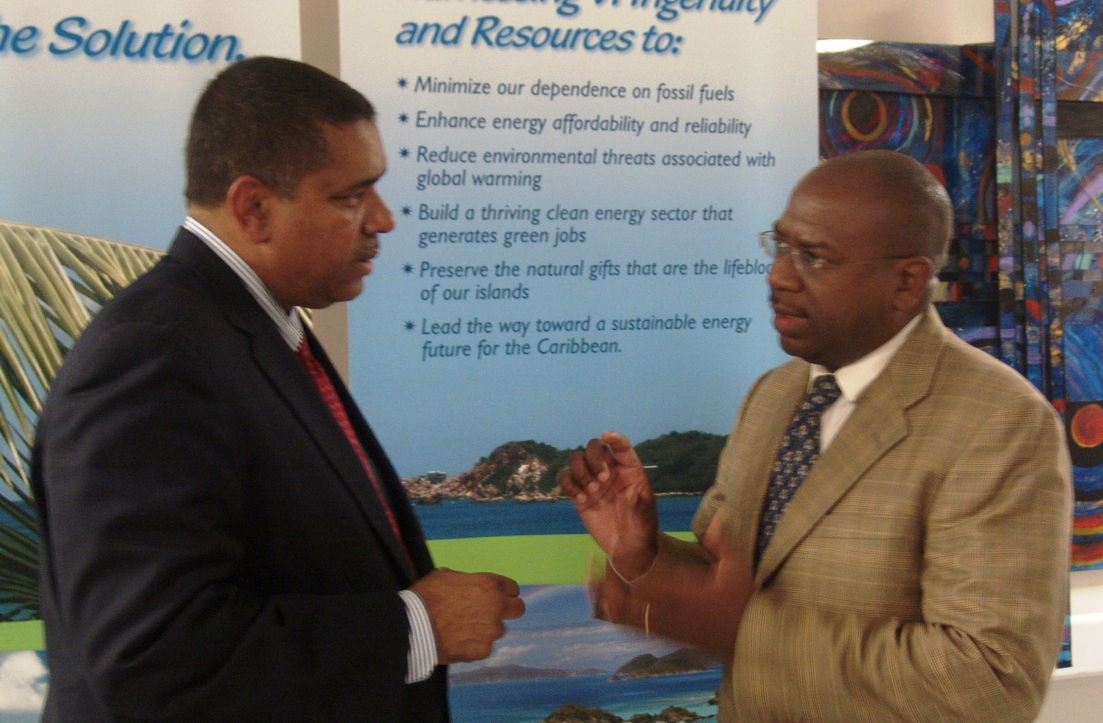
The two-day conference, "Harnessing Sun, Sea and Wind throughout the Caribbean," began Wednesday and was held at the V.I. Cardiac Center at St. Croix’s Juan F. Luis Memorial Hospital.
The conference, presented by Quality Electric Supply Inc., included panel discussions and workshops on such topics as financing and grants, water production and management, renewable energy strategies for residential and commercial properties, the role of generators in renewable energy projects, solar power, wind turbines and waste water management.
Scores of people representing power producers, government agencies and utilities were on hand.
DeJongh spoke about his administration’s efforts to reduce the territory’s dependence on fossil fuels, and of the economic boost such efforts can give the region.
The territory is still on track to achieve his goal of reducing the use of fossil fuels 60 percent by the year 2025, he said. “If we stay committed to the path it is very much achievable.”
The challenge is to do it in the midst of a sluggish economy, but the governor said one of the factors holding down that economy is also one of the big spurs for energy diversification, the closing of the Hovensa oil refinery. Now the territory has to wean itself off petroleum, according to deJongh, and is taking steps to do so.
One of those is exploring a transition from petroleum-fueled generators for the Water and Power Authority and switching to natural gas. It’s a long way from a done deal, and there are plenty of hurdles yet to overcome, but the governor said it’s a distinct possibility.
Natural gas is much less expensive than petroleum and much more abundant. There are also ample supplies of it in North America, which means there aren’t issues about being dependent on foreign oil. Across the United States utilities and refineries and big manufacturing companies are converting, and reaping big benefits, with electricity bills that are fractions of similar bills in the territory.
The conversion of WAPA’s generators from oil to natural gas is a straightforward mechanical engineering process, the governor said. But supply and storage are the big issues.
In the states, it’s just a matter of tapping into existing pipelines or building new ones. Out here in the Caribbean, the fuel has to be shipped in, and the amounts needed for the territory are relatively small and difficult to ship economically. If the fuel is shipped as liquid natural gas, a plant might need to be set up to convert it back to a gas.
One solution might be found 40 to 50 miles to the west, where Puerto Rico is also showing interest in converting to natural gas. With its larger population and industry, Puerto Rico would make it more economical to ship gas to the region, then barge it to the V.I., deJongh said.
And the U.S. Virgin Islands are just the first in a long chain of islands that could benefit from the less expensive fuel, he added, increasing the incentive for a business to set up a supply chain.
The territory is proceeding on a variety of other paths aimed at reducing dependence on petroleum, including recent contracts to install solar electric panels on both St. Thomas and St. Croix, wind turbines and investigation of creating an energy grid.





